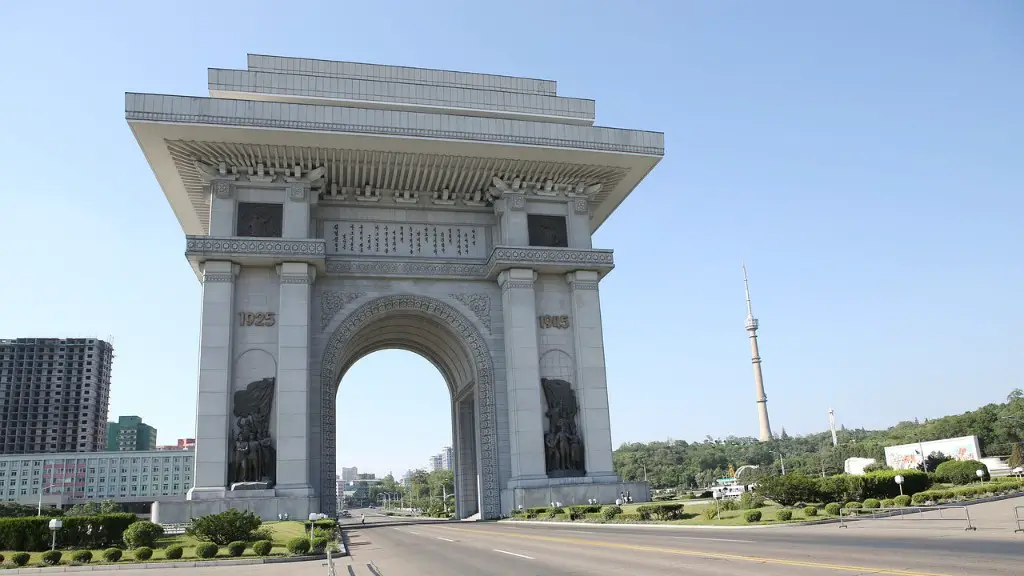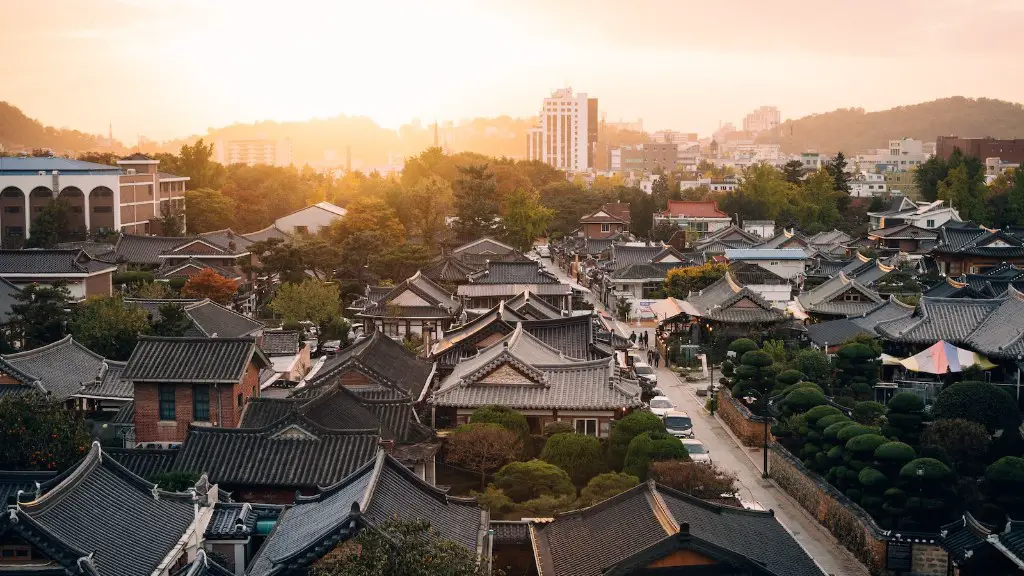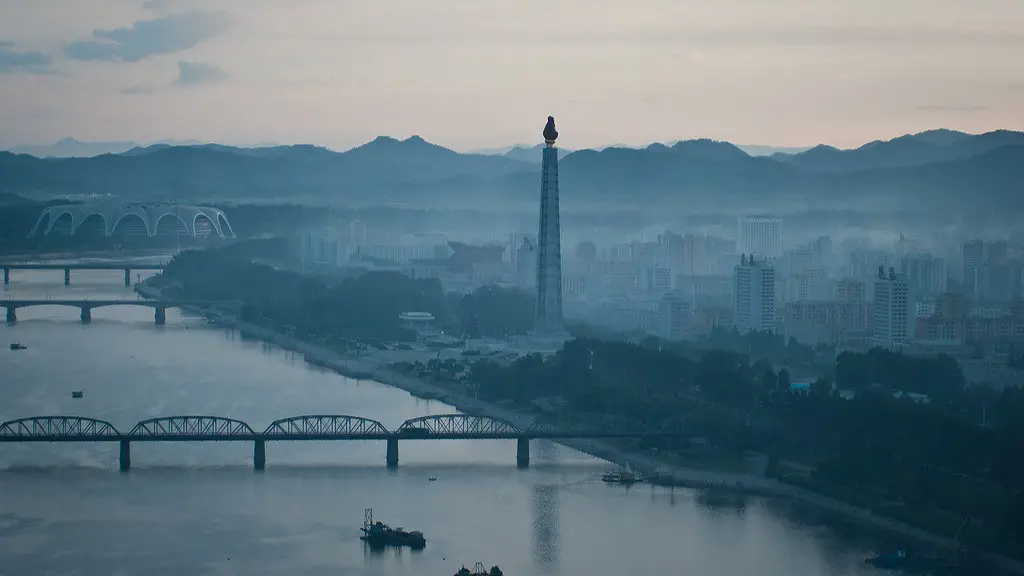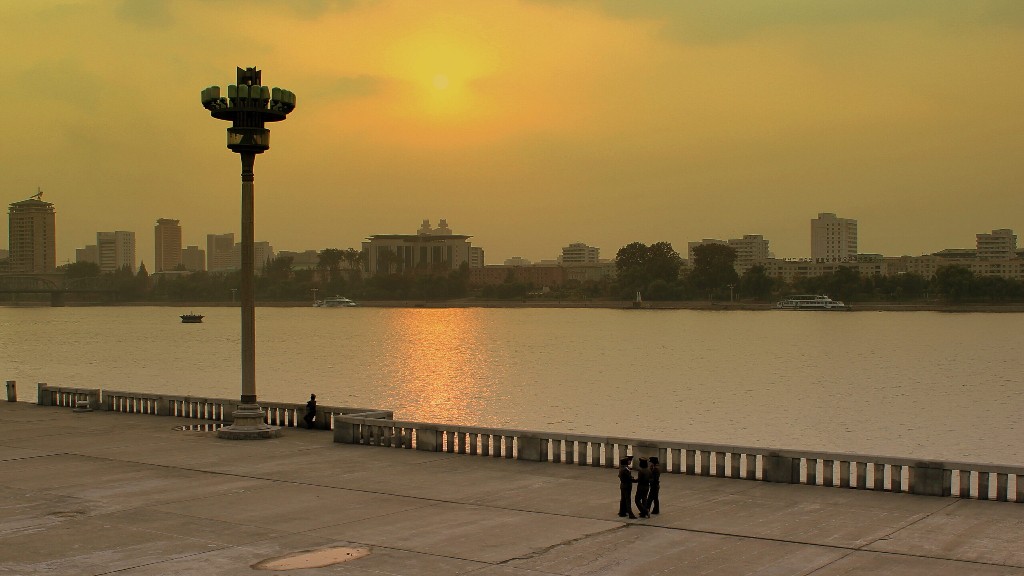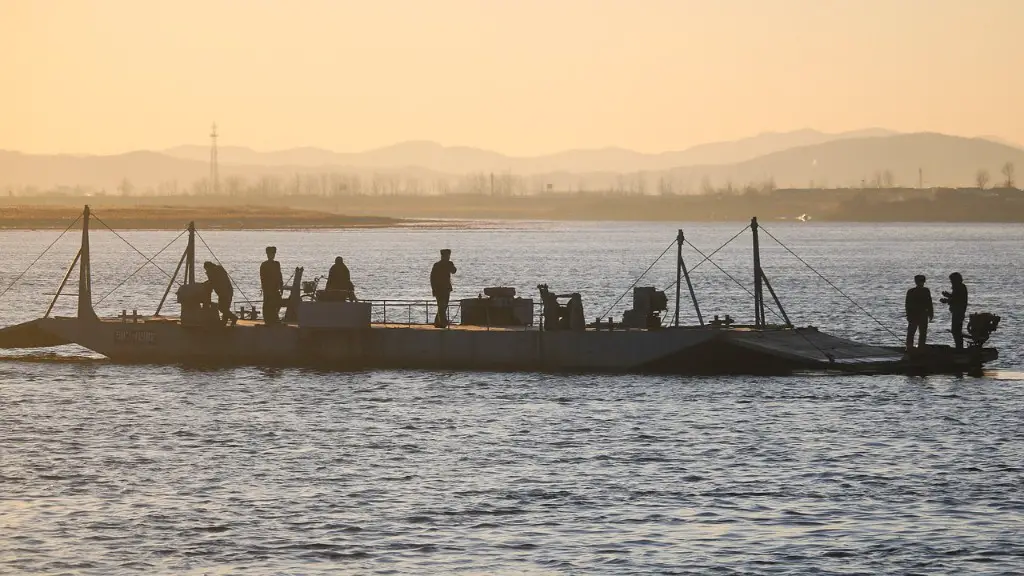What is North Korea’s capital? Pyongyang is the capital city of North Korea, and has been since 1947. Pyongyang is the largest city in the country, with a population of over three million people. Pyongyang is located on the Taedong River, which flows into the Yellow Sea. Over the past 100 years, Pyongyang has become an important political, economic, and cultural center in North Korea.
Pyongyang has been the seat of power since the foundation of North Korea in 1948. Over the past seventy years, the city has gone through tremendous changes from a mostly rural farming area to one of the most modern cities in Asia. Under the rule of the first leader Kim Il-Sung, Pyongyang underwent major infrastructural developments and some of the most iconic buildings in the city were built during this period.
The city is known for its monumental architecture, as well as its grand public squares and monuments. Pyongyang’s grandiose architecture includes such monuments as the Arch of Triumph and the Juche Tower. The city also contains many important political institutions, including the Monument to the Foundation of the Workers’ Party of Korea. There are also several significant religious sites in the city, such as the Kumsusan Palace of the Sun, which is where the bodies of North Korea’s two former leaders, Kim Il-sung and Kim Jong-il are entombed.
Since the foundation of North Korea, Pyongyang has seen a dramatic increase in its population. From a modest 100,000 in 1948, the city now has a population of over three million. This population growth was due largely to the post-Korean War industrialization policies implemented by Kim Il-sung. Over the past few decades, Pyongyang has become a major industrial center, with a plethora of factories, plants, and businesses.
Pyongyang is also home to a number of educational and cultural institutions. The city is home to several universities, as well as the Kim Il-sung University, which is one of the most prestigious universities in the country. Other important cultural attractions include the Pyongyang Metro, the Pyongyang International Cinema Festival, and the Pyongyang Circus. In recent years, the city has also become a major tourist destination for both domestic and international tourists.
Pyongyang has become a symbol of the North Korean government’s ambitions and power. As the political and economic capital of the country, the city has become a symbol of the North Korean government’s success. This can be seen in the grand monuments, large-scale construction projects, and the presence of the North Korean elite. Pyongyang is also home to many of the country’s most important officials, including Supreme Leader Kim Jong-un and his family.
Economy of Pyongyang
The economy of Pyongyang is closely linked to that of North Korea. Pyongyang is the country’s economic and political heart and tourists can experience the full extent of the North Korean economy in the city. Pyongyang is home to a number of factories, manufacturing plants, and businesses. The city has also become a major hub for international trade, with ships from around the world bringing in goods.
Pyongyang is home to several important industries, including manufacturing, steel, textiles, and chemicals. The city also has a thriving retail sector, with countless shops, markets, and department stores in the city center. Pyongyang is also the main hub for the North Korean banking sector, with the headquarters of the Bank of Korea located in the city.
Despite its economic importance, Pyongyang has a relatively low standard of living compared to other major cities in Asia. Due to the country’s economic isolation, Pyongyang has been unable to attract large-scale foreign investment or to develop its economy as quickly as other cities. This has resulted in an economy that is unable to satisfy the needs of its citizens.
Pyongyang also has limited access to electricity, water, and fuel. This has had a significant impact on the city’s economic growth and development, as access to these resources is essential for businesses and industries to thrive. Despite these challenges, the city has managed to remain an important economic hub in the country.
Relation with the World
The relationship between Pyongyang and the international community is complex and has been strained in recent years. North Korea has long been seen as a pariah state, and the North Korean government has been accused of numerous human rights violations. Despite this, Pyongyang has managed to maintain some form of relations with the international community.
North Korea has signed bilateral agreements with numerous countries, including the United Kingdom, China, and Russia. Pyongyang also has friendly relations with some of its regional neighbors, such as South Korea, Japan, and China. There have also been diplomatic exchanges between North Korea and the United States in recent years.
North Korea is also a member of the United Nations, and this has allowed Pyongyang to maintain a certain level of ties to the international community. Pyongyang has also become increasingly open to international investments and economic cooperation. However, this has not been enough to significantly improve Pyongyang’s relations with the international community.
Despite the difficulties, Pyongyang still maintains a certain level of diplomatic relations with the international community. This has allowed Pyongyang to establish some level of dialogue between the two sides, which has been essential in maintaining peace and stability in the region.
Impact of Sanctions
Since 2006, the United Nations has imposed numerous economic sanctions against North Korea. These sanctions have had a significant impact on the North Korean economy, and have had a particularly detrimental impact on the people of Pyongyang. The sanctions have led to a decrease in trade and investment, as well as the de-industrialization of the city.
The restrictions on trade and investments have had a direct effect on Pyongyang’s economy. This has meant that there are fewer jobs available and an increase in poverty. The restrictions on imports have also had a detrimental impact on the availability of food and other basic necessities.
Despite the sanctions, Pyongyang is still a major political and economic hub in North Korea. The city continues to be the center of North Korea’s government and remains an important part of the country’s economy. Pyongyang is still the most modern city in the country and remains the focus of the North Korean government’s ambitions.
In recent years, there have been efforts to ease the sanctions on Pyongyang in order to help the city’s economic development. However, these efforts have yet to have a measurable impact on the city’s economic situation. Pyongyang remains a long way away from becoming the economic powerhouse that it was once envisioned.
Pyongyang’s Political History
Pyongyang has long been a major political center in North Korea. The city has been the seat of power for the country since its foundation in 1948. Pyongyang has seen numerous political changes since then, as it has been ruled by two successive leaders, Kim Il-sung and Kim Jong-il. Pyongyang was one of the centers of the Korean War and has been in the international spotlight ever since.
Kim Il-sung was the first leader of North Korea and became the leader of Pyongyang in 1948. Under his rule, Pyongyang underwent major infrastructure development and saw the creation of many iconic buildings. Kim Il-sung also implemented a series of economic and industrial reforms, which transformed Pyongyang into a modern city.
Kim Jong-il inherited Pyongyang after his father’s death in 1994. During his reign, Pyongyang underwent further economic and political reforms, as well as a major military buildup. Pyongyang also became the center of the “military-first” policy of the North Korean government.
In 2011, Kim Jong-un took over as Supreme Leader of North Korea and made Pyongyang the center of his rule. Under Kim Jong-un, Pyongyang has become increasingly isolated from the international community and there has been a major crackdown on dissent within the city. Despite this, Pyongyang remains the center of North Korea’s government and continues to be an important political center in the region.
Life in Pyongyang
Life in Pyongyang is vastly different from that of other cities in the world. The city is under the constant watch of the North Korean government, and residents must abide by the numerous rules and regulations of the state. Due to the country’s economic isolation, Pyongyang’s citizens face numerous hardships, including restrictions on basic necessities.
Despite these hardships, Pyongyang does have some modern amenities. The city is home to numerous shopping malls, restaurants, and department stores. There are also theaters, movie theaters, and several parks in the city. Pyongyang is also home to numerous universities and other educational institutions.
The North Korean government has also implemented a series of cultural campaigns that have had a significant impact on life in Pyongyang. These campaigns promote traditional values and the veneration of the country’s two leaders, Kim Il-sung and Kim Jong-il. These campaigns have also seen the proliferation of flags, monuments, and other symbols of North Korean nationalism throughout the city.
Pyongyang remains a mysterious city that is often shrouded in mystery. Despite its political and economic importance, the city remains largely unknown to the outside world. Pyongyang remains an important political and economic center in North Korea, and its future remains uncertain.
